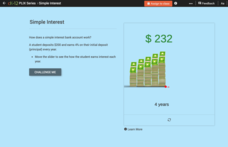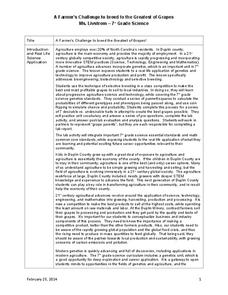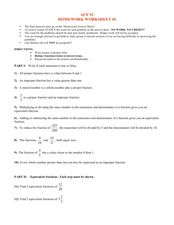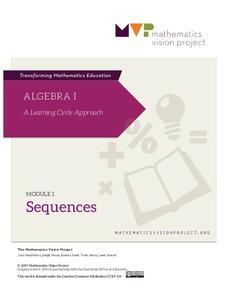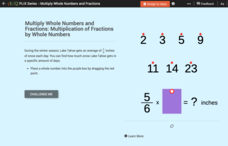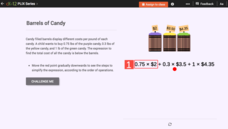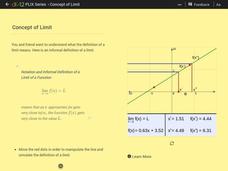Wells Fargo
Wells Fargo History Museum: Curriculum Guide
Learn about the California Gold Rush from an institution that has been in place since the early days of the American West: Wells Fargo History Museum. From domain-specific vocabulary review to group research projects, an expansive packet...
Houghton Mifflin Harcourt
Leveled Problem Solving: Angles
This splendid assignment gets future engineers to compute complementary or supplementary angles in real-life applications! Once they have mastered the art of additive angles, they can apply their knowledge to help Steve, Inez, Carlotta,...
CK-12 Foundation
Visual Patterns: Building the Queen's Tower
A resource fit for a queen. Scholars recognize and continue a pattern in towers people are building for a queen. They write and use an algebraic expression for the number of tiles in the towers.
CK-12 Foundation
Logistic Functions: Fab Fitness
Strengthen your understanding of logistic functions. Young mathematicians change the carrying capacity of a logistic function and see how function values change. The function models the number of members in a gym over time.
CK-12 Foundation
Simple Interest
Mathematicians manipulate a mountain of money to solve six questions about simple interest. Question types include several multiple-choice and one discussion.
Kenan Fellows
A Farmer’s Challenge to Breed to the Greatest of Grapes
What does your class know about GMOs? Are they savvy to selective breeding? Challenge young minds to engineer the greatest crop of all time using a hands-on genetics unit. Learners discover the good and bad details of selective breeding,...
Curated OER
Math Homework: Fractions
In this fractions worksheet, students complete true/false questions, find equivalent fractions and use order of operations to solve problems that included exponents.
Super East Math
Long Division with Whole Numbers
Learning long division can be an difficult journey for young mathematicians, but this simple skills practice learning exercise will help them on their way to fluency.
Mathematics Vision Project
Geometric Figures
Logical thinking is at the forefront of this jam-packed lesson, with young mathematicians not only investigating geometric concepts but also how they "know what they know". Through each activity and worksheet, learners wrestle with...
Curated OER
Supplementary, Complementary, and Vertical Angles
By using circles that they cut out and label themselves, learners literally "get a grip" on the angles they identify: supplementary, complementary, and vertical. They solve missing measurements based on properties of supplementary,...
Mathematics Vision Project
Module 1: Sequences
Sequences are all about recognizing patterns. A module of 11 lessons builds pupils' understanding of sequences through pattern analysis. The practice connects the analysis to linear and exponential equations. This is the first module in...
Santa Barbara City College
How to Make a Multiplication Table
Teach children how to make a multiplication table, and they'll be multiplying for life. Following this series of steps, young mathematicians learn to use patterns and the relationships between numbers to create their very own...
Brigham Young University
The Giver: Magic Squares
Combine math and vocabulary in a fun activity based on Lois Lowry's The Giver. Before kids begin the book, they look up the definitions of 16 vocabulary words and complete a puzzle that will give them the same number.
CK-12 Foundation
Decimal Rounding Given Place Value
Tests mathematicians' knowledge of decimals, place value, and rounding with a five-question interactive. A tool with movable parts assists scholars in answering questions—multiple-choice and true or false. A discussion question...
Curated OER
Most Likely/Least Likely
Learners consider a practice problem which prompts them to choose the type of marble most likely to be picked out of a group. Then, they answer probability-type questions regarding a spinner, and a tally chart of coins.
Arizona Department of Education
Introduction to Integers
Welcome to the backward world of negative numbers. This introductory lesson teaches young mathematicians that negative numbers are simply the opposite of positive numbers as they use number lines to plot and compare single-digit integers.
EngageNY
Modeling Relationships with a Line
What linear equation will fit this data, and how close is it? Through discussion and partner work, young mathematicians learn the procedure to determine a regression line in order to make predictions from the data.
Practical Money Skills
Student Loans
If your learners are college bound, they'll need a lesson about student loans and personal finance before they step into their dorm room. A four-day lesson guides high schoolers through the process of budgeting for college, as well as...
Northern Arizona University
Adding and Subtracting Fractions
Pattern blocks and shapes demonstrate how to add and subtract fractions. By aligning blocks with different shapes, learners figure out how to create a whole, and then how to add and delete parts from that whole.
CK-12 Foundation
Multiplication of Whole Numbers by Fractions: Multiplication of Fractions by Whole Numbers
An interactive challenges mathematicians to multiply fractions by whole numbers. A model provides a clear visual aid in preparing whole numbers to be multiplied. Six questions include multiple-choice, fill in the blank, short answer, and...
CK-12 Foundation
Order of Operations: Barrels of Candy
We'd all love to have barrels of candy. An interactive shows the steps in evaluating a numerical expression that reflects the cost of buying several different barrels of candy.
CK-12 Foundation
Sampling Distribution of a Sample Mean: The Mean of the Average Ages
What does it mean to take the mean of the mean? An easy-to-use interactive has users adjust the mean ages of different samples. Finding the average of these sample means gives an estimate of the population mean.
CK-12 Foundation
Concept of Limit
There's no limit to how useful the resource can be. Scholars use a slider interactive to investigate limits from graphs. They take both one-sided and two-sided limits into consideration.
EngageNY
Estimating Probability Distributions Empirically 2
Develop probability distributions from simulations. Young mathematicians use simulations to collect data. They use the data to draw graphs of probability distributions for the random variable in question.






